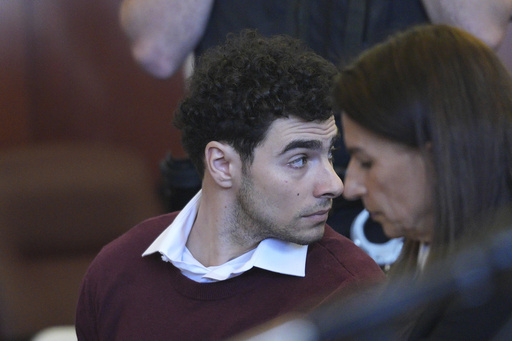NEW YORK — On Monday, the individual charged with the murder of UnitedHealthcare’s CEO entered a not guilty plea to state murder and terrorism charges, while his defense lawyer criticized remarks made by the mayor of New York, claiming they jeopardize the chance for a fair trial.
Luigi Mangione, 26, appeared in a Manhattan court in shackles, where he leaned towards the microphone to present his plea. Last week, Manhattan’s district attorney charged him with several murder counts, including one that classifies the act as terrorism. This state case will run concurrently with the federal prosecution he faces.
Negotiations of the two cases unfold on parallel tracks, with the state trial expected to commence before the federal one. Federal charges could lead to the death penalty, while state charges carry a maximum sentence of life imprisonment without the possibility of parole.
During the hearing, one of Mangione’s lawyers expressed concerns that officials, including Mayor Eric Adams, have politicized the case, infringing on Mangione’s rights and potentially compromising the jury’s impartiality. Lawyer Karen Friedman Agnifilo articulated her worries over her client’s right to a just trial.
Last Thursday, Mayor Adams and several police officials were present among numerous armed officers when Mangione was extradited back to Manhattan from Pennsylvania. The mayor remarked to a local news outlet that he wanted to confront Mangione, calling the incident a “terroristic act” in “a city loved by its people.”
Agnifilo accused law enforcement of orchestrating a highly visible transfer for Mangione, labeling it as an unnecessary display. She criticized the media spectacle surrounding his arrival, stating, “It was the biggest stage perp walk I’ve encountered in my career.”
The attorney also alleged confusion caused by the conflicting legal strategies pursued by both federal and state authorities, likening Mangione’s situation to being tossed back and forth between competing legal systems.
Judge Gregory Carro, who presides over the state trial, acknowledged his limitations regarding external matters but assured that Mangione would receive a fair trial. Authorities maintain that Mangione shot and killed Brian Thompson while he was on his way to an investor conference in Manhattan on December 4.
Mangione was taken into custody at a McDonald’s in Pennsylvania after a five-day search. Police found a firearm on him that matched the weapon used in Thompson’s murder, along with a fraudulent identification card and a notebook containing aggressive sentiments towards the health insurance sector and its wealthy leaders.
At a recent press briefing, Manhattan District Attorney Alvin Bragg highlighted that the invocation of terrorism laws underscored the gravity of the “terrifying, well-planned, targeted murder meant to evoke shock.” He described the killing as an act intended to instill fear among the public.
Currently, Mangione is detained in a Brooklyn federal jail, sharing space with notable defendants like Sean “Diddy” Combs and Sam Bankman-Fried. During his court appearance, he exhibited moments of levity, engaging with his lawyers and stretching after his handcuffs were removed.
Outside the courthouse, a small group of supporters rallied, chanting “Free Luigi,” accompanied by the sound of a trumpet. Natalie Monarrez, a 55-year-old Staten Island resident, joined the demonstration citing personal losses resulting from denied insurance claims. She expressed, “This situation, extreme as it may be, has sparked a crucial conversation on these issues — enough is enough; people are tired.”
Previously an Ivy League graduate from a notable family in Maryland, Mangione appeared to have isolated himself from relatives and peers in recent months, often voicing his struggles with back pain on online platforms. Notably, he was never a client of UnitedHealthcare.
Brian Thompson, the victim, was a dedicated executive at UnitedHealth Group for two decades, becoming the CEO of its insurance division in 2021. Thompson’s death has stirred public grievances against U.S. health insurers, with Mangione’s actions acting as a symbol of the widespread discontent over denied coverage and high medical costs. This incident has also instilled fear in the corporate community, with executives reporting an upsurge in threats.
